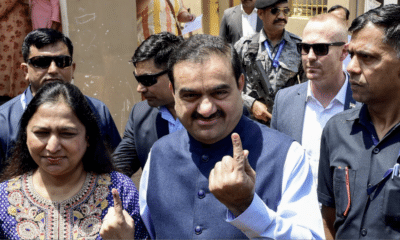Global News
Fresh Controversy: Hindenburg’s Follow-Up Challenges SEBI Chief’s Defense
Hindenburg Research, known for its critical investigations, has once again taken center stage with a series of tweets addressing recent statements made by SEBI Chairperson Madhabi Puri Buch and her husband, Dhaval Buch. These statements were meant to clarify their investment activities amidst the allegations Hindenburg raised on August 10, 2024, but instead, they seem to have deepened the controversy.
The Buchs’ Defense and Hindenburg’s Counter
The Buchs’ response aimed to clarify that their investment in a fund in 2015, while they were private citizens in Singapore, was unconnected to Madhabi Buch’s later role at SEBI. The investment was influenced by Anil Ahuja, a childhood friend of Dhaval Buch, who was the Chief Investment Officer of the fund. According to the Buchs, the fund never invested in any securities related to the Adani Group, a claim backed by Ahuja.
SEBI Chairperson Madhabi Buch’s response to our report includes several important admissions and raises numerous new critical questions.
(1/x) https://t.co/Usk0V6e90K
— Hindenburg Research (@HindenburgRes) August 11, 2024
However, Hindenburg was quick to counter these explanations, raising what it describes as critical new questions. The research firm pointed out that Madhabi Buch’s admission of investment in what they labeled an “obscure” Bermuda/Mauritius fund structure could indicate a deeper connection to the very entities SEBI was supposed to investigate. Hindenburg emphasized that Ahuja, who managed the fund, was not only a childhood friend of Dhaval Buch but also an Adani director at the time, suggesting a potential conflict of interest.
Questions of Transparency and Conflict of Interest
Hindenburg’s response did not stop there. They argued that SEBI, under Madhabi Buch, was investigating funds linked to the Adani Group, which could potentially include the fund she invested in. This raises significant concerns about whether Buch’s position at SEBI could have influenced the investigation, knowingly or unknowingly, creating a conflict of interest.
Also read: Rahul Gandhi Calls for Accountability: Questions SEBI’s Integrity Amidst Hindenburg Allegations
Moreover, Hindenburg brought to light details about two consulting companies established by Madhabi Buch—one in India and the other in Singapore. While Buch stated that these companies became dormant after she joined SEBI in 2017, Hindenburg questioned this claim. The firm revealed that Madhabi Buch still holds 99% ownership of the Indian entity, Agora Advisory Limited, which remains active and generated significant revenue while she was serving as SEBI Chairperson. They also highlighted that the Singaporean entity, Agora Partners Singapore, was under her ownership until March 2022, during her tenure as a Whole Time Member of SEBI, before being transferred to her husband.
These revelations led Hindenburg to question whether Madhabi Buch might have engaged in undisclosed business activities through these entities during her time at SEBI, further complicating the narrative around her commitment to transparency.
Unanswered Questions and a Call for Full Disclosure
Hindenburg’s response didn’t just challenge the Buchs’ explanations; it demanded full transparency. The research firm raised concerns about the potential undisclosed business activities and investments that may have been conducted under her husband’s name during her SEBI tenure. They urged Madhabi Buch to release a comprehensive list of consulting clients and details of engagements through both the Indian and Singaporean consulting firms, along with any other business dealings involving her or her husband.
Also read: Why is SEBI’s X Profile Locked? Questions Arise as Public Regulator Goes Dark
The firm’s demands for a full public investigation reflect their stance that these issues are not just about potential financial misconduct but also about the integrity of India’s financial regulatory framework. Hindenburg’s insistence on transparency aligns with Madhabi Buch’s earlier promises, pushing her to demonstrate that SEBI’s commitment to transparency is more than just rhetoric.
The Broader Implications
This exchange between Hindenburg and SEBI Chairperson Madhabi Buch highlights the complexities of financial regulation in an era where global capital flows through intricate networks of investments. The questions raised by Hindenburg are not just about the specific case involving the Buchs but also about the broader issue of transparency and accountability in financial oversight.
As this controversy unfolds, the public and financial markets will be closely watching how SEBI and its Chairperson respond. The outcome of this dispute could have far-reaching implications for the credibility of SEBI and the integrity of India’s financial regulatory system.









































Pingback: Madhabi Puri Buch family Past Investment in a fund Under SEBI Scrutiny